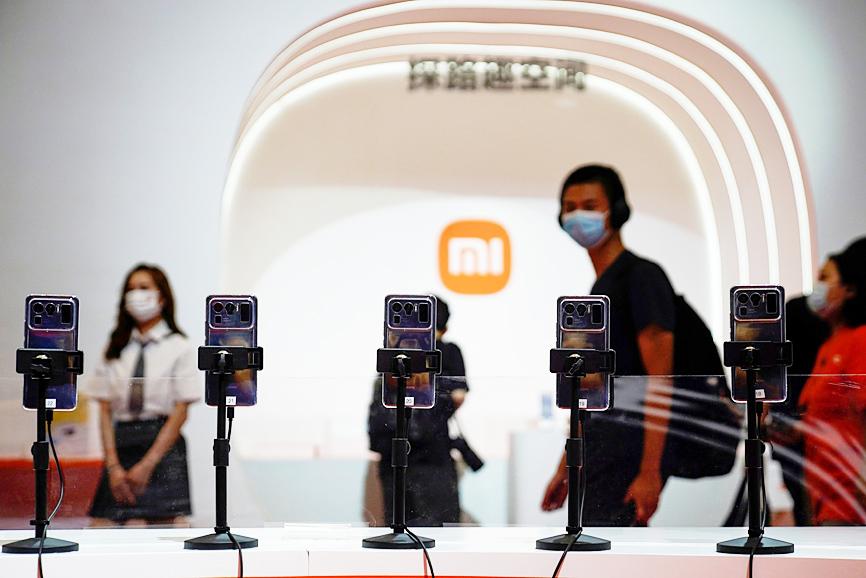Xiaomi Corp (小米) is planning to buy autonomous driving technology start-up Deepmotion for about US$77.4 million, sealing a deal to help further its ambitions of getting into the fast-expanding field.
The company announced the acquisition after reporting better-than-expected results for the second quarter, when a recovery in key markets like India helped it overtake Apple Inc to become the world’s second-largest smartphone vendor by shipments.
Revenue surged 64 percent to 87.79 billion yuan (US$13.5 billion) last quarter, surpassing the 85.01 billion yuan average of estimates.

Photo: Reuters
Xiaomi CEO Lei Jun (雷軍) is spearheading a drive to take the firm beyond smartphones.
The 51-year-old is personally leading a project to make electric vehicles (EVs), and the company has pledged an initial investment of US$10 billion over the next decade in the business.
Lei has said that the company has deep enough pockets to fund such a project, which requires years of heavy investment in development and manufacturing before the first vehicle can even be sold.
Xiaomi’s shares yesterday slid as much as 4.7 percent, their biggest intraday fall in a month, after investors again punished Chinese tech stocks.
The stock was weighed down also by lingering concerns about Xiaomi’s growing outlay on EVs.
“Xiaomi’s results were very strong so the reaction appears to be just broader tech weakness,” Bloomberg Intelligence analyst Matthew Kanterman said. “Some concern remains about the degree of investment into Xiaomi’s smart vehicle business, but these are longer-term initiatives and not impacting near-term results.”
The acquisition of Deepmotion, which develops driver assistance software, is the latest in a series of moves Xiaomi is making to delve deeper into a crowded field.
A number of tech giants from Huawei Technologies Co (華為) to Baidu Inc (百度) have already spent years developing components and vehicle technologies.
Xiaomi president Wang Xiang (王翔) on Wednesday said that the purchase is intended to help the firm develop level 4 self-driving technology, which allows full autonomous driving.
“Through this acquisition, we hope to shorten the time to market for our product,” Wang told reporters after releasing results. “We want to speed up our autonomous driving R&D [research and development].”
While other details about Xiaomi’s EV efforts remain unclear, it has initiated a hiring spree of 500 engineers for the project, and has talked to multiple automakers and local authorities for potential partnerships.
The company has also looked at investing in Black Sesame Technologies, a start-up that develops artificial intelligence chips and systems for vehicles.
On Wednesday, Xiaomi reported that net income climbed more than 80 percent to 8.27 billion yuan last quarter, sezing the No. 2 position globally for the first time, in part after shipments in India almost doubled from a year earlier.
Lei this month set his sights on reaching the top spot within three years, taking advantage of the waning fortunes of local rival Huawei, whose capacity has been hobbled by US sanctions.

China’s Huawei Technologies Co (華為) plans to start mass-producing its most advanced artificial intelligence (AI) chip in the first quarter of next year, even as it struggles to make enough chips due to US restrictions, two people familiar with the matter said. The telecoms conglomerate has sent samples of the Ascend 910C — its newest chip, meant to rival those made by US chipmaker Nvidia Corp — to some technology firms and started taking orders, the sources told Reuters. The 910C is being made by top Chinese contract chipmaker Semiconductor Manufacturing International Corp (SMIC, 中芯) on its N+2 process, but a lack

TECH BOOST: New TSMC wafer fabs in Arizona are to dramatically improve US advanced chip production, a report by market research firm TrendForce said With Taiwan Semiconductor Manufacturing Co (TSMC, 台積電) pouring large funds into Arizona, the US is expected to see an improvement in its status to become the second-largest maker of advanced semiconductors in 2027, Taipei-based market researcher TrendForce Corp (集邦科技) said in a report last week. TrendForce estimates the US would account for a 21 percent share in the global advanced integrated circuit (IC) production market by 2027, sharply up from the current 9 percent, as TSMC is investing US$65 billion to build three wafer fabs in Arizona, the report said. TrendForce defined the advanced chipmaking processes as the 7-nanometer process or more

NVIDIA PLATFORM: Hon Hai’s Mexican facility is to begin production early next year and a Taiwan site is to enter production next month, Nvidia wrote on its blog Hon Hai Precision Industry Co (鴻海精密), the world’s biggest electronics manufacturer, yesterday said it is expanding production capacity of artificial intelligence (AI) servers based on Nvidia Corp’s Blackwell chips in Taiwan, the US and Mexico to cope with rising demand. Hon Hai’s new AI-enabled factories are to use Nvidia’s Omnivores platform to create 3D digital twins to plan and simulate automated production lines at a factory in Hsinchu, the company said in a statement. Nvidia’s Omnivores platform is for developing industrial AI simulation applications and helps bring facilities online faster. Hon Hai’s Mexican facility is to begin production early next year and the

Who would not want a social media audience that grows without new content? During the three years she paused production of her short do-it-yourself (DIY) farmer’s lifestyle videos, Chinese vlogger Li Ziqi (李子柒), 34, has seen her YouTube subscribers increase to 20.2 million from about 14 million. While YouTube is banned in China, her fan base there — although not the size of YouTube’s MrBeast, who has 330 million subscribers — is close to 100 million across the country’s social media platforms Douyin (抖音), Sina Weibo (新浪微博) and Xiaohongshu (小紅書). When Li finally released new videos last week — ending what has